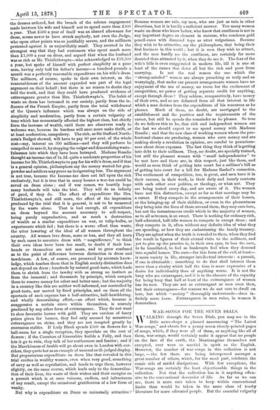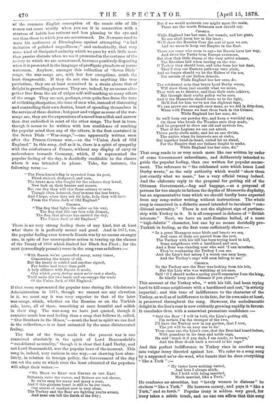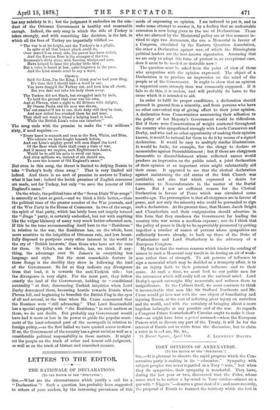WAR-SONGS FOR THE SEVEN DIALS.
WALKING through the Seven Dials, you may see in the little news-shops a placard announcing "The Latest War-songs," and obtain for a penny seven closely-printed pages of songs, which, if they were all of them, or anything like all of them, war-songs, would certainly make it appear that no people on the face of the earth, the Montenegrins themselves not excepted, ever were so martial in spirit as the English. However, the number of war-songs in this collection is not large, — the few there are being interspersed amongst a great number of others, which, for the most part, celebrate the comic side of sordid dissipations. With few exceptions, the War-songs are certainly the least objectionable things in the collection. Not that the collection has in it anything offen- sive to the conventional decencies of life. As far as we can see, there is more care taken to keep within conventional limits than would be taken in the same class of trashy literature for more educated people. But the essential vulgarity of the common English conception of the comic side of life comes out more vividly when you see it in connection with a stratum of habits less reticent and less pleasing to the eye and ear than those to which you are accustomed. Dr. Newman used to warn his audiences at Birmingham against attempting "a bad imitation of polished ungodliness ;" and undoubtedly, that very same kind of dissipated audacity which we pass by with little more than passive distaste when we see it presented in the costume of the society to which we are accustomed, becomes positively disgusting when it is presented in the language of profligate plumbers or jocose watermen. Anyhow, amongst this collection of Seven Dials' songs, the war-songs are, with but few exceptions, much the least disagreeable. If they do not rise into anything like true patriotism, they are at least conceived in a strain above that of delight in grovelling pleasures. They are, indeed, by no means alto- gether free from the air of vulgar self-will marking so many others of the songs. They are not, perhaps, even quite free from the tone ef rollicking dissipation, the tone of men -who, instead of distrusting and controlling their own desires, boast of spending themselves in the service of those desires ; but poor and vulgar as some of the war- songs are, they are the expressions of a mood less selfish and narrow than that embodied in most of the other songs. The best in tone, though it seems to be written with less confidence of reaching the popular mind than any of the others, is the first contained in the Seven Dials "War-songs,"—one apparently written soon after the Franco. German war,—on the "Union Jack of Old England." In this song, dull as it is, there is a spirit of sympathy with the misfortunes of France, without any display of envy or malevolence towards Germany, which, if it represented the popular feeling of the day, is decidedly creditable to the classes whom it was intended to please. Take, for instance, the following verse :—
The Frenchmen's flag is uprooted from its post, Blood-stained, disfigured, and torn, The brave men who fought for the colours they loved, Now look on their banner and mourn.
But one day they will rise those colours to save, Though often defeated, they're none the less brave, And I hope, when they ask for help, help they will have From the Union Jack of Old England."
Cuonus.
"The flag that lights the sailor on his way, The flag that fills our foes with dismay, The flag that always has carried the day, The Union Jack of old England."
There is no very strong feeling there of any kind, but at least what there is is perfectly sound and good. And in 1871, too,
the popular feeling even towards Russia was by no means an angry one, in spite of her unscrupulous action in tearing up the clauses of the Treaty of 1856 which limited her Black Sea Fleet ; for the
next (exceedingly prosaic) verse in the song runs as follows :—
" With Russia we've quarrelled many, many times, Concerning the treaty of old,
But the treaty is settled and another signed, Far better and truer than gold.
A holy alliance with Russia is made,
O'er which party feeling must ne'er cast a shade, 'Twill unite the two lands and encourage the trade Of the Union Jack of Old England."
If that verse represented the popular tone during Mr. Gladstone's Administration in 1871, though we cannot see any elevation in it, we must say it was very superior to that of the later war-songs, which, whether on the Russian or on the Turkish side, have, all of them, something at once boastful and selfish in their ring. The war-song we have just quoted, though it contains much less real feeling than a song that follows it, called, "Our Brothers in the Mines,"—much the best in spirit we can find in the collection,—is at least animated by the same disinterested feeling.
The first of the Songs made for the present war is one conceived absolutely in the spirit of Lord Beaconsfield's "conditional neutrality," though it is clear that Laid Derby, and not Lord Beaconsfield, was the popular hero of the moment. This song is, indeed, very curious in one way,—as showing how abso- lutely, in relation to foreign policy, the Government of the day can set the note to which even the least educated of the populace will adapt their voices :—
" WE MEAN TO KEEP OUR EMPIRE IN THE EAST.
Britannia rules the waves, and Britons are not slaves, So we've sang for many and many a year, And if this glorious boast is still to be our toast, Our course of conduct now is very clear.
The Turkey and the Bear are fighting you're aware,
And none can tell the finish of the fray;
CI
But if we would maintain our might upon the main, These are the words Britannia now should say.
CHORUS.
While England has her sons, her vessels, and her guns, No one shall harm her in the least ;
We'll show the Russian Czar the sort of men we are, And we mean to keep our Empire in the East.
There are some who seem to say—let Russia have her way,.
And drive the Turks from Europe evermore, But then they little dream of the very artful scheme, The Russians laid when forcing on the war.
If Turkey they should beat, and take from her her fleet,.
They'd stop our Eastern pathway very plain, And no longer should we be the Rulers of the sea, Nor certain of our Indian domain.
While England has her sons, cte.
The celebrated note that brave Lord Derby wrote, Will show them just exactly what we mean, They wish us to deceive, and thus their ends achieve, But through their crafty policy we've seen.
And if the Muscovite should force us to the fight, He'll find for him we've not the slightest fear, We can prove our strength once more, as we did in fifty-four,.
When with France we beat them back in the Crimea.
While England has her sons, Sm.
So we'll keep our powder dry, and keep a watchful eye, On those who break the Treaties once they made,- And be prepared to show our old and envious foe, That of his Legions we are not afraid, Throw party-strife aside, and let no one The nation when its interests are at stake, But together hand-in-hand, united let us stand, For the Empire that our fathers fought to make.
While England has her sons, dm"
That song reads to us very much more like one written by order- of some Government subordinate, and deliberately intended to, guide the popular feeling, than one written for popular amuse- ment. The reference to "the celebrated note which brave Lord Derby wrote," as the only authority which would "show them just exactly what we mean," has a very official twang indeed. And the elaborate reply to the proposal for getting rid of the Ottoman Government,—bag and baggage, —as a proposal of persons far too simple to fathom the depths of Muscovite duplicity, has an argumentative tone which we should hardly have expected from any song-writer writing without instructions. The whole song is conceived in a didactic mood intended to inculcate "con- ditional neutrality." There is not the slightest sign of partisan- ship with Turkey in it. It is all composed in defence of "British interests." Next, we have an anti-Russian ballad, of a more " high-falutin' " character, but one by no means decidedly pro- Turkish in feeling, as the first verse sufficiently shows :— " In a great Menagery some birds and beasts we see, And some of them are parted from the rest,
The Turkey with his bill has been trying hard to kill, Some neighbours with a hardihood and zest, And a Bear was standing near who said can interfere,. They're weakening the Turkey I can see.
And the Lion's fast asleep I a watch can easy keep, And the Turkey's cage will soon belong to me.'
Cnonus.
So the Turkey saw the Bear was looking from his lair, But the Lion who was watching at his ease, Said 'if I should make a spring you'll remember lam the king,. So kindly keep your distance if you please."
This account of the Turkey who, "with his bill, had been trying hard to kill some neighbours with a hardihood and zest," is strictly impartial ; and this tone of indifference to the character of the Turkey, as well as of indifference to its fate, for its own sake at least, is preserved throughout the song. However, the melodramatic delight in the lion's roar is now evidently growing rapidly in favour. It concludes thus, with a somewhat premature confidence :—
" Said the Bear I will be bold, the Lion's getting old,
I'm certain I'm the stronger of the two, I'll have the Turkey now in my garden, that I vow, The job will be an easy one to do.' Then came out the Lion's tear, that the Bear had heard before, With grandeur in its deep and noble rage, He said touch it if you dare, I am ready, so beware,' And the Bear slunk back a coward to his cage."
And this perfect indifference to Turkey rises in another song into vulgar irony directed against her. We refer to a song sung by a supposed ne'er-do-weel, who boasts that he does everything " like a Turk " :—
" My tastes have nothing varied, And love I always shirk, But I hold with being married, Much married, like a Turk."
He confesses no atrocities, but "lovely women in distress" he- shelters "like a Turk." He borrows money, and pays it "like a Turk," and so forth." Popular irony is seldom very good, for irony tales a subtle touch, and no one can affirm that this song-
has any subtlety in it ; but the judgment it embodies on the con- duct of the Ottoman Government is healthy and reasonable enough. Indeed, the only song in which the side of Turkey is taken strongly, and with something like decision, is the last, in which all the foes of Turkey are impartially vilified :—
"The war is at its height, and the Turkey's in a plight, In spite of all that honest pluck could do,
Over match'd on every side, his power has been defied, And the Russian Bear is the stronger of the two. Ronmania's dirty slurs, with Servian whelps and curs, Have helped to lame the plucky little bird ;
But a voice is heard at last, quite forgotten in the past,
And the Lion stands erect to say a word.
Omura.
Said the Lion, I'm the King, I think you've had your fling, It's time that I should have a word to say, You have dragg'd the Turkey out, and torn him all about, But you dare not take his body clean away.
The Turkey did not flinch, but struggled inch by inch, To hold the ground that ever was his own, And at Plevna, what a sight to fill Britons with delight, By Osman Pasha and his men was shown, Tho' out number'd ten to one, their duty still they've done, And now defeat has crushed them far and near, They shall not want a friend a helping hand to lend, While the British Lion's voice can interfere."
The song ends with the promise to make the "six millions" sixty, if need requires :—
"Every heart is staunch and true to the Red, White, and Blue,
The colours we have fought beneath before, And our Lion's mighty growl will soon dispel the howl Of the Bear when there shall come a time of war, And if money we require, each Englishman's desire, Would be to add his mite to swell our fame,
And sixty millions we, instead of six should see,
To save the honour of Old England's name."
But even in this song, the threat is limited to defying Russia to take "Turkey's body clean away." That is very limited aid indeed. And there is no sort of promise to restore to Turkey what it has lost ; indeed the lavish promises of English resources are made, not for Turkey, but only "to save the honour of Old England's name."
On the whale, the political tone of the "Seven Dials' War-songs" is assuredly at least as good,—and we think a little better,—than the political tone of the greater number of the War journals, and of the War Party in the House of Commons. In two of the songs, the spirit of that party, which has lately been not inaptly termed the " Jingo " party, is certainly embodied, but not with anything like the vulgar blatancy of many very much better-educated men. If this be the tone recommending itself beat to the "Residuum" in relation to the war, the Residuum has, on the whole, been more sensitive to the iniquities of Ottoman rule, and less boast- fully disposed to postpone every other interest in the world to the cry of 'British interests,' than those who have set the tune for them. St. Giles's, on the whole, has, we think, if any- thing, the advantage over St. James's in everything but language and style. But the most remarkable feature in these Songs is the docility they show in following the lead -of the Government. So far as they indicate any divergence from that lead, it is towards the anti-Turkish side ; but the divergence is very slight. For the most part, they follow -exactly the lead of the Government, holding to "conditional neutrality" at first, denouncing Turkish iniquities when Lord Derby denounced them, becoming hostile towards Russia when Plevna fell, and beginning to brandish the British Flag in the eyes of all and several, at the time when Mr. Cross announced that the Russians were "still advancing." That Lord Beaconsfield has a special sympathy with "the Residuum" in such matters as these, we do not doubt. But probably any Government would have had it more or less in its power to guide the popular senti- ment of the least-educated part of the metropolis in relation to foreign policy,—as the first ballad we have quoted seems to show. If so, the Government of the country has a great social as well as a considerable political responsibility in these matters. It might set the people on the track of sober and honest self-judgment, as well as on the track of blatant and conceited menace.




































 Previous page
Previous page